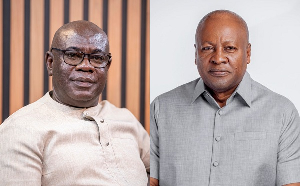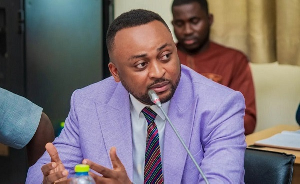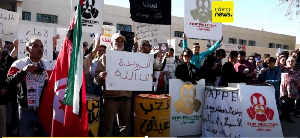By Anthony Kwaku Amoah
Mr. Jacob Kor would tell you he is the “chief servant” of Ghana Education Service (GES). Dr Stephen Adu and Mrs Elizabeth De-souza are his acting deputies. All the Divisional, regional and district directors and officers are also at post and working. Heads of schools and staff also deserve mention for their hard work. GES is a public service; it draws its support and strength from parents, corporate bodies, donor agencies and philanthropists.
Actually, Ghana’s education is for all. Everybody is a stakeholder and shareholder. We all must know what happens to our education and how to improve it. We cannot achieve “Education for All” if we should ignore and disobey the rights, views and inputs of others. GES manages and controls pre-tertiary education in staff recruitment, postings, transfers, promotions, training and development, study leave, conditions of service and code of discipline. It collates and analyses data for sound decision making and review of educational policies and programmes.
This article is not the full report of activities of GES from January to date. It is just a highlight of some of the things, such as payment of capitation grant and special levies. Records say GH¢12.3 million has been paid as arrears of the Capitation Grant for the third term of 2014/2015 academic year and part payment of first term of 2015/2016. An amount of GH¢18.0 million has been released as subsidy to senior high technical and vocational schools for the third term of 2014/2015. About GH¢1 billion is quoted to have been paid for wages and salaries to 298, 286 staff in March. Feeding grant of GH¢1.7 million has been released for payment to pupils and students in the 39 special schools nationwide for the first term of 2015/2016.
It has emerged that in line with the Progressively Free Senior High School programme, each of forms two and three students in 486 day schools received GH¢38.00. To ensure that school heads followed due process in disbursing the cash, monitoring and supervision was done in schools in Greater Accra, Eastern and Ashanti regions. I was privileged to join a team of directors to La Presbyterian Senior High School in Accra.
GES acknowledged receipts of a number of projects and programmes said to have received approval for payment by students as special Parent-Teacher Association’s levies. In the first quarter of this year, 50 projects and programmes received approval. The levies mostly ranged from GH¢20.00 to GH¢50.00. Approximately 60% of the levies was expected to be used on school projects with just a few schools having requested part of the levies to be spent on improving contact hours through extended classes.
It should be appreciated that the Ghana Partnership for Education Grant (GPEG) package in 75 deprived districts is slated for expiry by August, this year. The first quarter witnessed the disbursement of GH¢16.9 million to the beneficiary districts for them to undertake projects as stipulated by their Annual Programme of Work (APW).
Directors and officers are not being left to grow stale on the job. They are regularly equipped with modern skills in management and administration. I do recall, for instance, the training workshop organised by the Human Resource Management Division (HRMD) in January for 67 new directors of education at Koforidua. It exposed the participants to the policies and procedures in GES. It also sharpened their knowledge in staff recruitment, management and performance appraisal. Another workshop was done at Ejisu near Kumasi for divisional directors, regional directors and human resource officers on financial management, public accounts, internal controls, among other things.
To ascertain the level of academic preparedness of teachers and pupils for the new school term, a monitoring exercise was done in some districts of Greater Accra, Volta, Eastern, Ashanti and Central regions in January under the aegis of the Curriculum Research and Development Division (CRDD). The exercise evaluated schools in the area of availability of instructional materials.
GES monitors schools and their performance every now and then. All the Divisions of the Service work to ensure that the right things happen in our schools and to our pupils and teachers towards promoting holistic education. Heads of some 500 non-performing senior high schools, district chief executives and district directors of education met at Kumasi in February to review the performance of students in the 2015 West African Secondary School Certificate Examinations. Strategies were devised for enhanced performance in the future and I also participated as a rapporteur for GES.
To improve access to and participation in technical/vocational education, Augustine Ayarizang’s Technical Vocational Education and Training Division, in the first quarter of the year, held a competency-based training workshop for 150 teachers from selected technical and vocational institutions. As we speak, a computer technology syllabus has been developed for technical and vocational schools. There is also “Agripreneurship” now as part of the curriculum for agricultural institutions and some technical/vocational schools that run agriculture at the certificate level.
The Teacher Education Division, under the directorship of Dr (Mrs) Evelyn Owusu-Oduro, held a workshop in February to mainstream instructional strategies in kindergarten module as a step towards promoting quality early childhood education. It also created the forum for vivid discussion on the role of stakeholders, such as chief examiners in the mainstreaming project.
In its bid to beef up special and inclusive education, Lawyer Anthony Boateng’s Special Education Division (SPED) organised a sensitisation programme for stakeholders in Greater Accra. The Division has facilitated porting activities in special schools. Through its Braille Press Unit, SPED has produced braille textbooks for use by pupils and students with visual impairment.
GES, within the first quarter, presented a proposal to Ministry of Education on the posting of teachers from the colleges of education for 2016/2017. It indicated in the said proposal that the current arrangement, where the 38 public colleges of education are being posted to basic schools to teach, should stay. A justification on the need for GES to post qualified personnel from accredited private colleges of education has also been made and it is hoped that district directors will advertise vacancies and recruit their own teachers when education becomes fully decentralised.
As part of efforts to promote “Education for All”, a total of 54,850 out-of-school children in Northern, Upper East, Upper West and Brong Ahafo regions enrolled under the Complementary Basic Education programme in 2014/2015 while 47,517 learners were mainstreamed into formal education. In 2015/2016, 52,625 learners were enrolled and coverage for the programme is estimated to have gone up from 120,000 to 200,000 by 2018.
GES declared 2,400 vacancies for teachers of English Language, Mathematics, Integrated Science, Chemistry, Physics and Biology at the public senior high school level. The advertisement, which existed from March 10 to March 21, has taken delivery of 18,460 applications. Shortlisting is ongoing and the understanding is that qualified applicants will soon be contacted for a selection interview.
Just last month, Director General Kor, in consultation with GES Council, appointed new directors, including Ms. Judith Esther Ofeibea Donkor to HRMD as Director, Felicia Boakye-Yiadom for CRDD, Gertrude Mensah for Eastern Region, Cynthia Bosumtwi-Sam for Basic Education, David Afram for Central Region and Rosetta Addison Sackey for Inspection. Others are; Nelson Aborigia Ayamba for Yendi District, Dr Evelyn Owusu Oduro for Teacher Education, Beatrice Zalia Ali for Supplies and Logistics, and Alexander Buadi for Volta Region. The rest are; Patricia Ayiko for Upper West, Jane Sabina Obeng for Upper East, Enyonam Afo Amafuga for Western Region, Kwadwo Osei Asibey for Brong Ahafo and Peter Attafuah for Greater Accra. Mr Kor said the changes were not for any bad motive but “A call to duty and a plan to streamline the operations of GES”.
The West African Examinations Council, with the support of GES, has designed the Item Differential Profile (IDP), a software, which operates on binomial theory, to detect collusion of students during objective tests. Education directors and school heads were told to let their pupils and students know of it so as to be cautious when writing their papers. The Public Relations Unit is also liaising with the media to reach out to the general public about this arrangement. Let’s all help!
The writer is an educationist and a Public Relations Officer at the Headquarters of the Ghana Education Service.
E-mail: amoatec27@yahoo.com
Opinions of Friday, 15 April 2016
Columnist: Amoah, Anthony Kwaku














